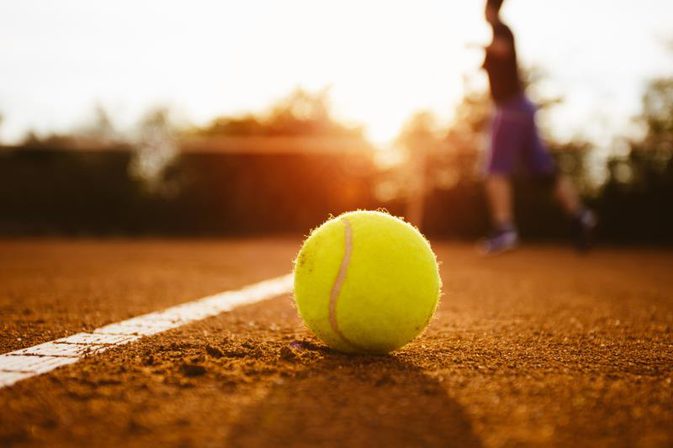Recall the commencement speech attributed to Kurt Vonnegut that began: “Ladies and Gentlemen of the class of ‘97. Wear sunscreen. If I could offer you only one tip for the future, sunscreen would be it. The long-term benefits of sunscreen have been proved by scientists, whereas the rest of my advice has no basis more reliable than my own meandering experience. I will dispense this advice now….”? This passing of wisdom from guru to Grasshopper went viral before there was such a thing, but turns out it was not a commencement speech and was not written by Vonnegut. It was an article written by Chicago Tribune columnist Mary Schmich.
But sunscreen is the point. Soon many of us will be transitioning outdoors to play tennis, and Net and Clay contacted fellow tennis player and dermatologist Carol L. Neish, M.D., F.A.A.D., for some professional advice on the benefits of sunscreen and how to protect your skin.
Net and Clay: I know you will tell your fellow tennis players to wear sunscreen, but can you explain its importance?
Dr. Neish: Sunscreen helps prevent skin cancer by protecting your skin from the sun’s harmful ultraviolet (UV) rays. Anyone can get skin cancer, and it is estimated that one in five Americans will develop skin cancer in their lifetime. To protect your skin, I recommend using SPF 30 or higher and applying the appropriate amount, which is one ounce (a “shot glass”) for full body coverage. You must reapply every 2 hours and more frequently after sweating or swimming. Using the proper amount and reapplying is essential because most people under-apply sunscreens. Don’t forget to protect your scalp, ears, and back of your hands with sunscreen, and apply a lip balm which contains sunscreen with SPF 30 or higher.
For additional protection, wear a wide-brimmed hat or if you can’t do that because you’re on the tennis court, at least wear a cap or visor that shields your face. I also highly recommend lightweight sun protective clothing for outdoor activities. It doesn’t wash or sweat off and you don’t miss spots. It’s a great investment, and some brands include Coolibar and Columbia Sportswear. I also suggest limiting your time in the sun between 10:00 a.m. and 4:00 p.m., when the sun’s rays are the strongest.
Net and Clay: What does the SPF mean? Do the SPF numbers matter?
Dr. Neish: The SPF numbers can be a bit misleading and give people a false sense of security because SPF only measures the protection against the UVB rays. There is no analogous rating system for the UVA rays which penetrate the skinner deeper and can also cause damage. Thus, the best course is to use SPF 30 or higher, such as SPF 50, look for the terms “broad spectrum” on the sunscreen products, or look for products that contain zinc oxide and/or titanium dioxide. These ingredients provide protection against a wide range of the harmful UV rays.
Net and Clay: Are there certain products your recommend?
Dr. Neish: Our practice provides our patients with a list of over-the-counter sunscreens, as well as moisturizers that contain sunscreen. The products we recommend all receive high ratings from Consumer Reports (2018), and include a few personal favorites:
Laroche Posay SPF 60
Equate Sport SPF 50
Coppertone Water Babies SPF 50
Neutrogena Baby
Banana Boat Kids SPF 50
Aveeno Protect & Hydrate Lotion SPF 30
Neutrogena Wet Skin Stick SPF 70
Neutrogena Beach Defense Stick SPF 50
Net and Clay: Even when we’re not planning on being in the sunshine or outdoors for an extended period of time, do we still need to wear sunscreen?
Dr. Neish: Yes. I recommend using sunscreen every day when you are outside, not just when it’s sunny. Even on cloudy days, up to 80 percent of the sun’s harmful UV rays can penetrate your skin.
Net and Clay: Do sunscreens expire?
Dr. Neish: The FDA requires that all sunscreens retain their original strength for at least three years. Some sunscreens include an expiration date on the container, so if the expiration date has passed, discard it.
Net and Clay: Do all skin types and complexions need to be protected?
Dr. Neish: Skin cancer is a very common problem, and no skin type is immune! The same protection is needed for darker as well as lighter skin types. In fact, darker skin types can have the added problem of discoloration or melasma which exposure to the sun can worsen.
Dr. Neish is a tennis player and partner at South Hills Dermatology in Pittsburgh, Pennsylvania. She did her undergraduate and medical training, including her dermatology residency, at the University of Pittsburgh. She has been married for 34 years and has four children, two of whom played competitive tennis in high school.

Photo credit: Pamina Ewing
Check out our Pro Shop for products to protect your skin this summer!
